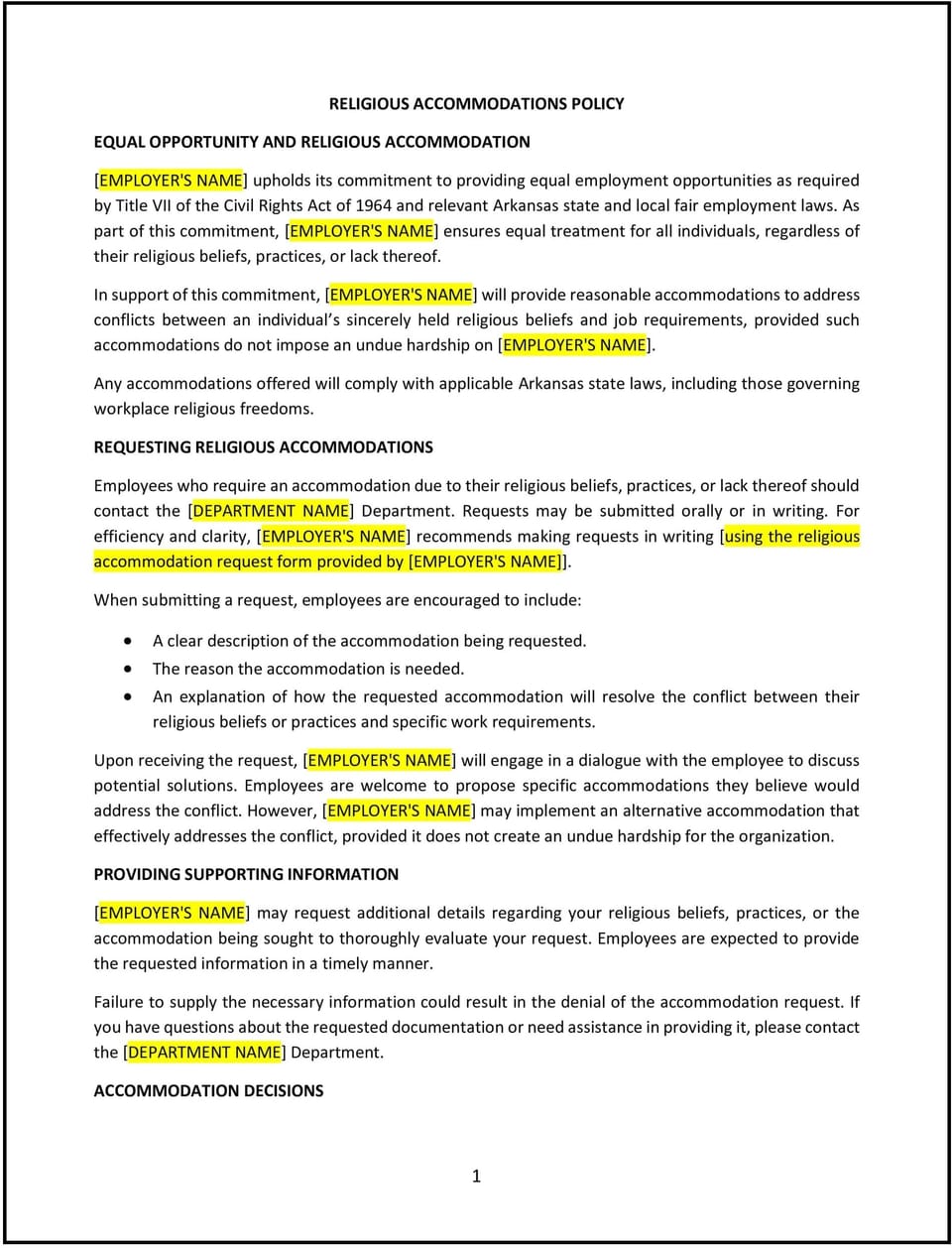Religious accommodations policy (Arkansas): Free template

Religious accommodations policy (Arkansas)
In Arkansas, a religious accommodations policy provides businesses with guidelines for addressing employee requests related to religious practices or beliefs. This policy ensures a consistent approach to handling such requests while fostering an inclusive workplace and supporting compliance with applicable state and federal laws, including Title VII of the Civil Rights Act.
This policy outlines the process for requesting accommodations, the evaluation criteria, and examples of reasonable adjustments businesses may provide. By implementing this policy, Arkansas businesses can promote workplace inclusivity, minimize conflicts, and ensure fair treatment for all employees.
How to use this religious accommodations policy (Arkansas)
- Define accommodations: Specify the types of religious accommodations the business may provide, such as flexible scheduling, dress code adjustments, or prayer spaces.
- Establish request procedures: Provide employees with clear instructions on how to submit accommodation requests, including documentation if required.
- Evaluate requests fairly: Outline the process for assessing accommodation requests, considering factors like business operations and undue hardship.
- Communicate decisions: Ensure employees receive timely feedback on their requests, including reasons for approval or denial.
- Maintain records: Document all accommodation requests and decisions to ensure transparency and compliance with the policy.
Benefits of using this religious accommodations policy (Arkansas)
This policy offers several advantages for Arkansas businesses:
- Promotes inclusivity: Demonstrates the business’s commitment to respecting diverse religious practices and fostering a supportive workplace.
- Reduces legal risks: Supports compliance with state and federal anti-discrimination laws, minimizing the potential for disputes or claims.
- Enhances employee morale: Builds trust by addressing employee needs in a fair and transparent manner.
- Maintains productivity: Provides a structured process for balancing accommodations with operational requirements.
- Encourages accountability: Establishes clear guidelines for employees and management, reducing ambiguity in handling requests.
Tips for using this religious accommodations policy (Arkansas)
- Address Arkansas-specific considerations: Ensure the policy aligns with state laws and reflects local workforce dynamics.
- Train managers: Educate supervisors on recognizing accommodation requests and evaluating them fairly and consistently.
- Use examples: Provide examples of reasonable accommodations to help employees and managers understand what adjustments may be possible.
- Balance accommodations with business needs: Assess requests to determine if they can be met without causing undue hardship to the business.
- Update regularly: Revise the policy to reflect changes in laws, workplace practices, or business operations.
Q: How does this policy benefit the business?
A: This policy fosters an inclusive workplace, supports compliance with Arkansas and federal anti-discrimination laws, and builds trust by addressing religious accommodation requests fairly.
Q: What are examples of reasonable religious accommodations?
A: Reasonable accommodations may include schedule adjustments, exemptions from certain dress codes, provision of prayer spaces, or time off for religious observances.
Q: How does this policy support compliance with anti-discrimination laws?
A: The policy aligns with Title VII of the Civil Rights Act and Arkansas regulations, helping the business handle accommodation requests lawfully and equitably.
Q: What steps should the business take to evaluate accommodation requests?
A: The business should assess each request individually, considering factors like operational impact and the feasibility of adjustments, while maintaining records of the decision process.
Q: How can the business address potential undue hardship?
A: The business can document the specific challenges posed by the request, such as financial costs or operational disruptions, to determine if accommodations can be reasonably made.
This article contains general legal information and does not contain legal advice. Cobrief is not a law firm or a substitute for an attorney or law firm. The law is complex and changes often. For legal advice, please ask a lawyer.


